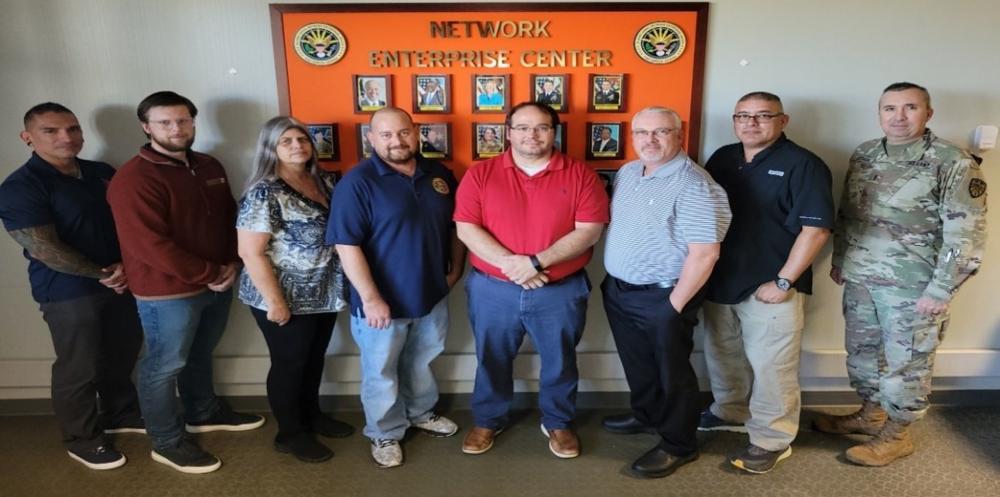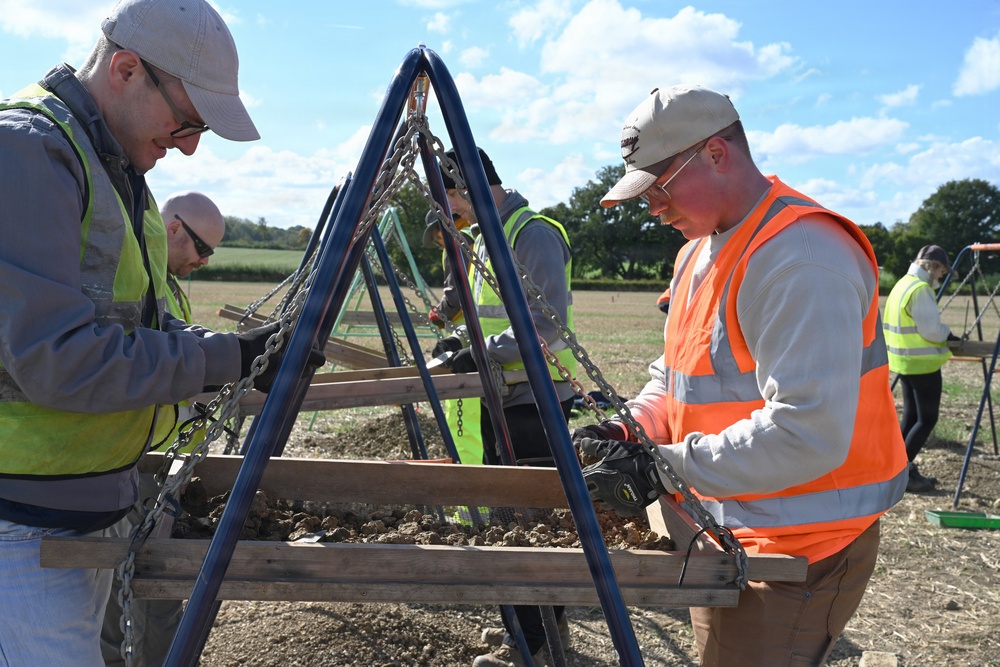DVIDS – News – Warrant Officer Corps; A critical part of NETCOM’s Workforce
FORT GORDON, Ga., – The U.S. Army defines Warrant Officers as technical experts, combat leaders, trainers, and advisors who specialize, throughout an entire career, in a specific technical area. Warrant Officer Corps comprises less than three percent of the total Army strength. And, although small in size, the level of responsibility is immense and only the very best become US Army Warrant Officers. The Warrant Officers serves as the technical and tactical experts, as the leader of a team, and are highly trained in their field. And the U.S. Army Network Enterprise Technology Command is right on board with that, as we will explore in a series of articles, the importance and necessity for Warrant Officers in NETCOM.
One such Warrant Officer, Chief Warrant Officer 4 Jose Estrada, Senior 255A Information Systems Technician was unique in that he made the journey to becoming an Army Warrant Officer by branching two services.
Born in Brownsville, Texas, and raised in El Paso, where he went to High School, Estrada a first-generation Mexican American had a passion to serve his country. “I enlisted right out of High School in 1997,” said Estrada. “I loved the opportunity to serve my country, travel the world, and get both a military and College education. I enlisted in the United States Marine Corps, where I served for almost 8 years; I then enlisted in the Army in 2006 with the goal of becoming an Army Signal Warrant Officer.”
Estrada realized what he wanted while serving during a combat tour. “When I was deployed to Fallujah, Iraq in 2004, as a Marine communications NCO [Non-commissioned Officer] I saw firsthand the role of Warrant Officers and how they were the technical experts in their filed. Everyone relied on the Warrant Officers and their expertise to be successful.”
Already well on his way becoming a technical expert in his field, the move was not as hard as it could have been. “My first enlisted MOS [military specialty] was a Marine 2018, Computer Electronics; then when I enlisted in the Army, I was a 14E, Patriot System Air Defender; when I became am Army Signal Warrant Officer with MOS 255A, Information Systems Technician. I chose the Signal Corps because I have always been interested and passionate about Information Technology as a whole but specially about communication systems,” said Estrada.
“My first enlisted MOS was a Marine 2018, Computer Electronics; then when I enlisted in the Army, I was a 14E, Patriot System Air Defender; when I became an Army Signal Warrant Officer with MOS 255A, Information Systems Technician,” Estrada said. “I chose the Signal Corps because I have always been interested and passionate about Information Technology as a whole but specially about communication systems.”
“The most prominent lesson I have learned by serving in the Signal Corps is how important the role of the Signal Branch is in support of combat operations,” said Estrada. “Soldiers are thought that to be successful they need to shoot, move, and communicate. The Signal Corps is instrumental in providing the ability to communicate to all Army Units and thus succeed in battle.”
Estrada attributes his success to the people he had worked with and for. “I recalled how my first Marine NCO Jason Foster, now a Marine Chief Warrant Officer 5, in my first unit and first duty station in Okinawa, Japan was instrumental as my first role model and supervisor to show me what a successful military member looks like.”
“Along the way, I had several people help me succeed in the Army, being my mentors and role models; among them, my Warrant Officer Basic Course ACE, Chief Warrant Officer 4 (ret) Louis Nash, my 4th ID CAB BDE S6 Lt. Col. (ret) Richard Michael, my 1AD CAB BDE S6 Lt. Col. (ret) Charles Woodruff, my 2/1 AD BDE S6 Lt. Col. Ernest Tornabell, and my current boss and supervisor, the 7th Signal CMD (T) G5 Steve Middleton and the deputy G5, Lt. Col. Stephen Marshall,” said Estrada.
Estrada’s current assignment with the 7th Signal Command is demanding but satisfying. “Some of my key responsibilities and duties as a senior 255A Chief Warrant Officer 4 in the 7th Signal Command’s include providing the 7th Commanding General necessary information to make critical decisions concerning Command, Control, Communications,” said Estrada. “Computers, and Intelligence systems and Department of Defense Information Network Army within the CONUS [continental United States] Theater for elements encompassing more than 84 percent of the Army’s strategic communication assets.”
“I also enable and synchronize the C4I capabilities of 3 Signal Brigades and 81 Network Enterprise Centers across 38 US States, and Puerto Rico, enabling multi-domain capabilities for US Southern Command, Forces Command, Training and Doctrine Command, Army Material Command, all CONUS based Army Service Component Commands, Corps, Divisions and Brigade Combat Teams.”
Estrada’s expectations are at the top just like his performance. “While assigned to the 7th Signal Command, I expect to be able to provide communications capabilities to our theater of operations and to the Army as a whole by designing, implementing, operating and maintaining the 7th Signal Command’s Commercial Solutions for Classified technology which currently provides services to over 1500 users in CONUS and around the globe.”
What he expects is “… to be able to operationalize and lead Army Commercial Solutions for Classified capabilities (CSfC) which will in turn provide the means for the United States Army to modernize its SIPRNet infrastructure,” said Estrada.
“Chief Warrant Officer 4 Estrada is definitely a huge asset and deserves to be recognized at every level,” said Chief Warrant Office 5 Kathleen A. Mahoney, 7th Signal Command (Theater) Command Chief Warrant Officer. “His outstanding support and dedication running all things CSfC is what has made it so successful.”
When looked at closely, it is easy to tell why Estrada is so successful. It’s all about the team and the people, and he best summed it up in closing. “My leadership style is fairly simple, it all starts with the golden rule: treat others like you would like to be treated,” said Estrada. “I have always believed that to be a leader you have to set the example. A leader leads from the front.”
“I have never and never will order a subordinate to do something that I haven’t done or wouldn’t do myself. I believe in asking, telling, and then ordering. I take the services part of my Information Services Technician MOS to heart. I am and will always be a service provider and to support my unit.”
For more news on NETCOM please visit: https://www.army.mil/netcom
| Date Taken: | 11.07.2022 |
| Date Posted: | 11.07.2022 16:05 |
| Story ID: | 432820 |
| Location: | FORT GORDON, GA, US |
| Hometown: | BROWNSVILLE, TX, US |
| Hometown: | EL PASO, TX, US |
| Hometown: | FORT GORDON, GA, US |
| Web Views: | 5 |
| Downloads: | 0 |
PUBLIC DOMAIN
This work, Warrant Officer Corps; A critical part of NETCOM’s Workforce, by Gordon Van Vleet, identified by DVIDS, must comply with the restrictions shown on https://www.dvidshub.net/about/copyright.


 Private Internet Access gives you unparalleled access to thousands
of next-gen servers in over 83 countries and each US state. Your
VPN experience will always be fast, smooth, and reliable.
Private Internet Access gives you unparalleled access to thousands
of next-gen servers in over 83 countries and each US state. Your
VPN experience will always be fast, smooth, and reliable.

